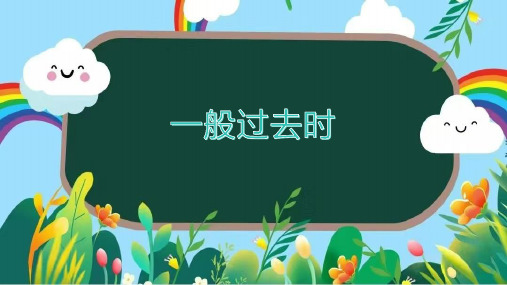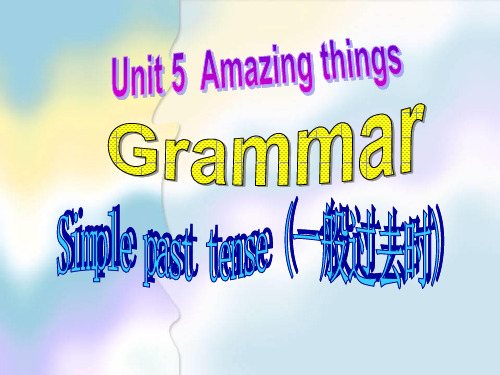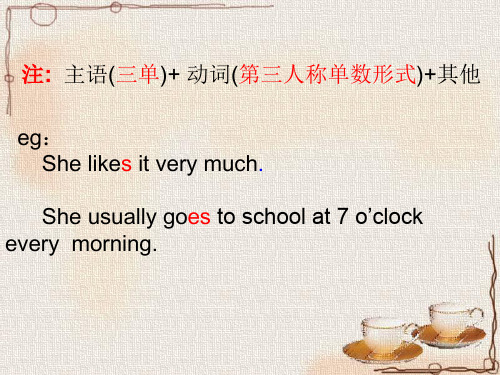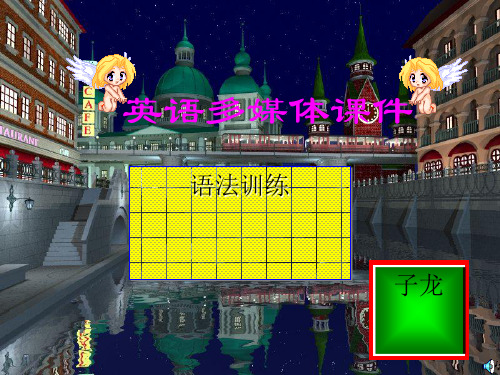一般过去时的讲解课件PPT
合集下载
一般过去时.语法讲解PPT

时间状语不同
一般过去时常用的时间状语包括过去的时间点、过去的时间段 等,而过去完成时常用的时间状语包括“已经”、“之前”等
。
05
一般过去时的练习与巩固
填空练习
总结词
填空练习是巩固一般过去时的有效方法,通过在句子中留空,让学生填写正确的动词时态,加深对一般过去时的 理解和运用。
详细描述
在填空练习中,教师可以选择一些包含一般过去时的句子,故意去掉动词时态部分,让学生根据上下文语境和时 态规则填写正确的时态。例如,“Yesterday, I ____(go) to the park with my family. We ____ (have) a great time.” 学生应该填写“went”和“had”。
表示过去的习惯或经常发生的动作
描述过去的习惯
一般过去时可以用来描述过去经常发 生的动作或习惯,例如“He used to smoke a pack of cigarettes a day” (他以前每天抽一包烟)。
描述过去的频率
一般过去时可以用来表示过去某个时间 段内发生的动作的频率,例如“We met every week”(我们每周见面一 次)。
一般过去时表示动作已经完成,而过去进行时则表示动作正在进行中。
总结词
时间状语不同
详细描述
一般过去时常用的时间状语包括过去的时间点、过去的时间段等,而 过去进行时常用的时间状语包括“当时”、“正在”等。
与过去完成时混淆的用法
总结词 详细描述
总结词 详细描述
动作是否完成
一般过去时表示动作已经完成,而过去完成时则表示在过去的 某个时间点之前已经完成的动作。
选择练习
总结词
选择练习是一种常见的练习方式,通过提供多个选项,让学生选择符合语境和语法规则的答案,进一 步巩固一般过去时的运用。
一般过去时常用的时间状语包括过去的时间点、过去的时间段 等,而过去完成时常用的时间状语包括“已经”、“之前”等
。
05
一般过去时的练习与巩固
填空练习
总结词
填空练习是巩固一般过去时的有效方法,通过在句子中留空,让学生填写正确的动词时态,加深对一般过去时的 理解和运用。
详细描述
在填空练习中,教师可以选择一些包含一般过去时的句子,故意去掉动词时态部分,让学生根据上下文语境和时 态规则填写正确的时态。例如,“Yesterday, I ____(go) to the park with my family. We ____ (have) a great time.” 学生应该填写“went”和“had”。
表示过去的习惯或经常发生的动作
描述过去的习惯
一般过去时可以用来描述过去经常发 生的动作或习惯,例如“He used to smoke a pack of cigarettes a day” (他以前每天抽一包烟)。
描述过去的频率
一般过去时可以用来表示过去某个时间 段内发生的动作的频率,例如“We met every week”(我们每周见面一 次)。
一般过去时表示动作已经完成,而过去进行时则表示动作正在进行中。
总结词
时间状语不同
详细描述
一般过去时常用的时间状语包括过去的时间点、过去的时间段等,而 过去进行时常用的时间状语包括“当时”、“正在”等。
与过去完成时混淆的用法
总结词 详细描述
总结词 详细描述
动作是否完成
一般过去时表示动作已经完成,而过去完成时则表示在过去的 某个时间点之前已经完成的动作。
选择练习
总结词
选择练习是一种常见的练习方式,通过提供多个选项,让学生选择符合语境和语法规则的答案,进一 步巩固一般过去时的运用。
一般过去时PPT获奖课件

Just now 刚刚 Last week 上周 in the past 过去 that day 那天 last year 去年 that year 那年 that month 那个月 just now 刚刚
一般过去时态句式旳构成
陈说句式
动词
肯定式
否定式
I was ….
I was not(wasn’t)….
订正答案 返回练习
一般过去时态练习
把下列句子改成相应时态
1. He usually gets up early in the morning.
But he
got up
late today.
2. She usually works from 8 a.m. to 5 p.m.
But yesterday she worked from 8 a.m. to 6 p.m.
3. stop 6. trip 9. want 12.have e 18.put 21.read
订正答案 返回上页
动词过去式转换练习
答案
1. look looked 4. carry carried 7. call called 10.are were 13.do did 16.say said 19.eat ate
did not(didn’t) work.
There was …. there There were…. be
There was not (wasn’t) …. There were not (weren’t)…问句式
动词
疑问句式和简略答语
第一人称
第二人称
be He /She/it was….
He/She/It was not(wasn’t)….
一般过去时态ppt课件

2、表示过去经常或反复发生的动作。 My father often went to work by bus last year. When I was a child, I often listened to music.
可编辑课件PPT
9
6.练习
1.They_w_e_re(be) doctors last year. 2.You _h_a_d(have) a class this morning. 3.She_ra_n_ (run) very fast yesterday.
passed cooked
2、元浊 /d/ ,即 ed 在元音,浊辅音后面念 /d/ ,
例:borrowed enjoyed
called moved
3、/t/ /d/ 之后念 /id/ , 即 ed 在 /t/ /d/ 音后面念 /id/
可编辑课件PPT
例:wanted shouted needed counted6
4.一般过去时的否定和一般疑问句 1)We had a good time yesterday.
We didn’t have a good time yesterday. Did you have a good time yesterday? 2)She was a teacher in 1980s.
4.She_s_tu_d_ied (study) Chinese two years ago. 5.He_p_la_yed(play) tennis last week.
6.He found an amusing book.(变否定和一般疑问)
He didn’t find an amusing book.
stop stopped plan planned
一般过去时(12张PPT)初中英语专项复习课件

The Country mouse went to the house of the City mouse. It was a very good house. Nice food was set ready for them to eat. But just as they began to eat they heard a great noise. The City mouse cried, " Run! Run! The cat is coming!" They ran away quickly and hid.
一般过去时 初中英语专项分析
一般现在时 de 应用场景
过
动作行为
去
发
生
曾经
的
存在的状态
识别 标志词 理解 句意
答题技巧
熟练 动词 转换
yesterday last week 3 days ago
动词 过去式
熟练 句型 转换
肯定 否定 疑问
一般 过去时 He played basketball yesterday.
yesterday? Yes, I did. No, I didn’t.
动词 过去式 形态的变化
一般
直接加 ed
二般
以 e 结尾,去 e 加 ed live dance hope use
动词 过去式 形态的变化
三般
重读辅元辅,双写尾字母
stop plan
四般
辅音字母 + y 结尾,把 y 变 i 加 ed cry study worry
标志词
时间状语:last night, yesterday, the day before yesterday last week, some years ago in 1995, the other day, just now, in the past
一般过去时 初中英语专项分析
一般现在时 de 应用场景
过
动作行为
去
发
生
曾经
的
存在的状态
识别 标志词 理解 句意
答题技巧
熟练 动词 转换
yesterday last week 3 days ago
动词 过去式
熟练 句型 转换
肯定 否定 疑问
一般 过去时 He played basketball yesterday.
yesterday? Yes, I did. No, I didn’t.
动词 过去式 形态的变化
一般
直接加 ed
二般
以 e 结尾,去 e 加 ed live dance hope use
动词 过去式 形态的变化
三般
重读辅元辅,双写尾字母
stop plan
四般
辅音字母 + y 结尾,把 y 变 i 加 ed cry study worry
标志词
时间状语:last night, yesterday, the day before yesterday last week, some years ago in 1995, the other day, just now, in the past
小学英语时态之 一般过去时讲解课件ppt

一般过去时态
一般过去时:
定义: 一般过去时,是表示过去某一时刻或某一段时间内发生的动作或存在
的状态。
标志词: yesterday, just now, …ago, last…, this morning …
结构: 谓语是be动词
谓语是行为动词
肯定句: 主语+ was/were + 其他 否定句: 主语+ was/were + not + 其他 一般疑问句: Was/Were + 主语+其他? 肯定句: 主语+ 动词的过去式 + 其他 否定句: 主语+ didn’t +动词原形 + 其他 一般疑问句:Did + 主语+ 动词原形 +其他?
at the weekends this morning often
usually
last Mid-Autumn Festival
every day three days ago on Mondays
tomorrow a moment ago 14 years ago
找出表示一般过去时的时间副词。
( B) 1. My mother had breakfast and____to work.
A. go B. went C. going D. to go
( A)2. -- How __ your vacation?
-- It was pretty good. A. was B. were C. did D. do
( )3.Each student one picture.
A.draw B. draws C. drawing D.to drawing
一般过去时:
定义: 一般过去时,是表示过去某一时刻或某一段时间内发生的动作或存在
的状态。
标志词: yesterday, just now, …ago, last…, this morning …
结构: 谓语是be动词
谓语是行为动词
肯定句: 主语+ was/were + 其他 否定句: 主语+ was/were + not + 其他 一般疑问句: Was/Were + 主语+其他? 肯定句: 主语+ 动词的过去式 + 其他 否定句: 主语+ didn’t +动词原形 + 其他 一般疑问句:Did + 主语+ 动词原形 +其他?
at the weekends this morning often
usually
last Mid-Autumn Festival
every day three days ago on Mondays
tomorrow a moment ago 14 years ago
找出表示一般过去时的时间副词。
( B) 1. My mother had breakfast and____to work.
A. go B. went C. going D. to go
( A)2. -- How __ your vacation?
-- It was pretty good. A. was B. were C. did D. do
( )3.Each student one picture.
A.draw B. draws C. drawing D.to drawing
一般过去时课件(PPT)

B pictures in the park 1.I ___
Exercises
last weekend. A.take B.took C.was D.draw
A 2. Did you ___football yesterday. A. play B. played C. were D. are
A 3.He always _____me last term. A. helped B. helps C. helping D. help 4.Where did you ___last B Monday? A.went B.go C.do D.did
climbed a mountain
mped
fly kites read a book sing and dance eat good food
swim do am/is are study
flew kites read a book sang and danced ate good food
6. He usually gets ____ (get) up at 6 getting in the morning. Look! He is ______ (get) up now. But yesterday he got (get) up very late, so he ____ went (go) to school late. He was ____ ___ (be) late for school.
动词原形、第三人称单数 动词过去式
They don’t watch TV in the evening. didn’t watch TV last night. They _________
She doesn’t play basketball after school. She _________ didn’t play basketball after school yesterday. Do you go to school on foot every day? go to school on foot yesterday. ___ Did you __ Does he go to school by bus every day?
一般过去时时态ppt课件

精选课件
3
第二个-----“四种时间状语”
• ① yesterday及相关短语。
• 例如:
• yesterday morning/afternoon/evening • 昨天上午/下午/晚上。 • ② “last+ 时间状语”构成的短语。 • 例如:
• last night/month/spring/year
“四种句式的构成”—有be动词
• ①肯定句:主语+was/were +其它 . • 例如:We were late yesterday. • 昨天我们迟到了。 • ②否定句:主语+was /were+not +其它. • We weren't late yesterday. (我们昨天没迟到
精选课件
精选课件
5
第三个—“四种谓语动词的表现形式”
• ① be动词的过去式was、were.
• 例如:She was a teacher five years ago.
• 她五年前是一名教师。
• ② 连系动词(连接主语和表语)的过去式。
• 例如:become-became She became angry.
• 1. They produce silk in Suzhou.(改为一般疑问 句)
• ___________________________________? • 2. They built a bridge between the two islands. (
改为否定句)
• ___________________________________?
• 詹妮昨天买了一件短裙。
• ② 一般过去时态的否定句式 “主语 +didn’t+动词原形+其它”
一般过去时讲解课件(共19张PPT).ppt

否定句
1) 主语+wasn’t/weren’t+表语
He wasn’t a student ten years ago.
2) 主语+didn’t+动词原形+其他
They didn’t have a good time last night.
4.一般过去时的结构
一般疑问句
was为单数; were为复数
一般过去时的结构
4.一般过去时的结构
was为单数; were为复数
肯定句
1) 主语+was/were+表语
He was a student ten years ago.
2) 主语+动词过去式+其他
They had a good time last night.
4.一般过去时的结构
was为单数; were为复数
时间+ago类 in+年份类
yesterday morning;yesterday.... last night; last week...
two days ago in 2023
动词过去式的变化
3.动词过去式的变化 1.直接加ed work--worked look--looked 2.不发音的e结尾,去e加ed hope--hoped like--liked 3.重读的闭音节词,双协结尾字母加ed stop--stopped plan--planned 4.以辅音字母加y结尾,变y为i再加ed study--studied try--tried 5.不规则变化
What did they do last night?
总结与练习
5.总结与练习
一般过去时 1.定义:表示一个过去发生的动作或表示过去存在的状 态 2.标志词:yesterday,last...,....ago, just now..... 3.动词的过去式变化 4.一般过去时的各种句型:
讲解(一般过去时)ppt课件

4
句型变化 1.系动词be
陈述句(肯定): She was a doctor two years ago. 陈述句(否定): She was not a doctor two years ago. 一般疑问句: Was she a doctor two years ago?
肯定回答:Yes, she was. 否定回答:No, she wasn’t. 特殊疑问句: When was she a doctor?
5
动词一般过去时,表示过去发生的事; be用was或用were, have,has变had; 谓语动词过去式,过去时间坐标志; 一般动词加-ed,若是特殊得硬记。 否定句很简单,主语之后didn’t添; 疑问句也不难,did放在主语前; 如果谓语之前有did,谓语动词需还原; 动词若是was,were,否定就把not添。
• 为什么她去年离开了学校? Why did she leave the 时
• 1.定义: 1)表示过去某个时间发生的动作或存在的状态,常和 表示过去的时间状语连用;2)也表示过去经常或反复发生的动 作,常和表示频度的时间状语连用。
• 标志性状语
2.时间状语:yesterday last night
6
7
8
• 1. look • 4. carry • 7. call • 10.like • 13.dance • 16.stay
2. live 5. hope 8. finish 11.play 14.cry 17.cook
3. stop 6. trip 9. want 12.watch 15.plan 18.invent
3. _____________________ on Sundays. They went to the park last Monday.
句型变化 1.系动词be
陈述句(肯定): She was a doctor two years ago. 陈述句(否定): She was not a doctor two years ago. 一般疑问句: Was she a doctor two years ago?
肯定回答:Yes, she was. 否定回答:No, she wasn’t. 特殊疑问句: When was she a doctor?
5
动词一般过去时,表示过去发生的事; be用was或用were, have,has变had; 谓语动词过去式,过去时间坐标志; 一般动词加-ed,若是特殊得硬记。 否定句很简单,主语之后didn’t添; 疑问句也不难,did放在主语前; 如果谓语之前有did,谓语动词需还原; 动词若是was,were,否定就把not添。
• 为什么她去年离开了学校? Why did she leave the 时
• 1.定义: 1)表示过去某个时间发生的动作或存在的状态,常和 表示过去的时间状语连用;2)也表示过去经常或反复发生的动 作,常和表示频度的时间状语连用。
• 标志性状语
2.时间状语:yesterday last night
6
7
8
• 1. look • 4. carry • 7. call • 10.like • 13.dance • 16.stay
2. live 5. hope 8. finish 11.play 14.cry 17.cook
3. stop 6. trip 9. want 12.watch 15.plan 18.invent
3. _____________________ on Sundays. They went to the park last Monday.
一般过去时(共22张PPT)

Finish Part C on page 62.
Millie: We _____ went (go) to the Fun World Museum the day before yesterday, Daniel. It ____ was (be) so interesting! Daniel: Really? Tell me all about it. Millie: OK. We ____ saw (see) a small monkey, only 11 centimetres tall. Daniel: That’s amazing! What else? Millie: We also _____ learnt (learn) about some strange birds like dodos. They _____ lived (live) on the earth a long time ago. Daniel: That’s cool!
一般过去时的否定句 (1)be动词的否定句
I/He/She/It You/We/They
was
were was not were not at home yeou/We/They
at home yesterday.
一般过去时的否定句
(1)be动词的否定句
1.Alice was outside one sunny day. Alice wasn't outside one sunny day. 2.Mary was at home yesterday. Mary wasn't at home yesterday. 3.We were in Beijing last week. We weren't in Beijing last week.
一般现在时和一般过去时ppt课件

carryies do es wash es visit s exercise s enjoy s jump s hhaavse
一般现在时否定式
be + not don’t do / doesn’t do
II 一般现在时的否定式
1.Be 动词的否定式: be + not
I am a teacher.
把下列句子改为否定句
1.My father has an egg for breakfast . My father doesn’t have an egg for breakfast .
2.Li Lei does his homework after school. Li Lei doesn’t do his homework after school.
1. We often __p_la_y_ (play) in the playground. 2. He _g_et_s_ (get) up at six o’clock. 3. _D_o_ you b_r_u_s_h (brush) your teeth every morning? 4. What d_o_e_she usually_d_o_ (do) after school? 5. Danny_s_t_ud_i_e_s (study) English, Chinese, Maths, Science and Art at school. 6. Mike sometimes _g_o_es__(go) to the park with his sister. 7. She w_a_t_ch_e_s (watch) TV with his parents every evening. 8.D__oe_s_ Mike _r_ea_d_(read) English every day?
英语多媒体经典课件(ppt 34页)PPT学习课件

而否定句就是在谓语动词前面加上 didn’t 然后动词变成原型。
1. They had a meeting last week.
2. Miss Li got to school twenty minutes ago.
3. I did homework on Saturday afternoon. 1. They didn’t have a meeting last week.
不规则变化
come ---came can---could may --- might leave --- left
read --- read do ---did eat --- ate have --- had write ---wrote put ---put think --- thought hear --- heard
afternoon? 2) What did Tim do last Sunday
afternoon? 3) When did Tim play football?
• 过去时的特殊疑问句
• 1) My parents studied in the USA When
•
①
②
③
• they were young.
He played basketball. She went to school.
Please look at the following sentences
I am twelve years old.
I was eleven years old.
He is in Beijing now.
He was in Shanghai yesterday.
They are in China today.
《英语一般过去时》课件

It can also be used to express returns or wishes about the past, such as "I wish I had gone to the concert" or "I return not having studied hard for the exam"
03
The sensitivity structure of the simple
past tense
Basic presence structure
I (subject) (verb) a (object)
write letter
Verb+Object: He
(subject)
won
(verb) a size
02
"We (subject) camera (Verb) from the airport (preliminary
phase)."
Subject+Verb+Infinite Phrase
03
"She (subject) wanted (Verb) to go shopping (Infinite
Simple past tense is often used to express past experiences or facts that are no longer relevant or meaningful in the presentation For example, "I learned how to swim when I was five years old" or "The Great Wall was built in ambient times."
一般过去时讲解PPT课件

。
did
助动词,用于构成一般过去时的 疑问句和否定句。
主语
句子中的动作执行者,可以是名 词、代词等。
例如
What did you do yesterday? 你 昨天做了什么?
其他成分
包括宾语、状语等,根据句子需 要而定。
动词原形
指动词的基本形式,即不加任何 时态或语态标记的形式。
特殊疑问句实例分析
when、after、 before、as等引导的 表示过去的时间状语 从句。
已经、曾经、刚才、 那时等表示过去的时 间副词。
02
一般过去时肯定句结构
主语+动词过去式+其他成分
01
02
03
主语
句子中的主体,可以是人 、物或抽象概念。
动词过去式
表示过去某个时间里发生 的动作或状态。动词的过 去式可分为规则变化和不 规则变化两种。
表示过去某个时间里发生的动 作或状态。
用法
陈述过去的事实或情况,描述 过去经常或反复发生的动作。
现在完成时
表示过去发生的动作对现在造 成的影响或结果,或从过去已 经开始,持续到现在的动作或 状态。
用法
强调过去与现在的联系,表达 一个动作从过去一直延续到现
在。
两者在时间状语上的区别
01
02
03
04
一般过去时
一般过去时讲解PPT课件
目录 Contents
• 一般过去时基本概念 • 一般过去时肯定句结构 • 一般过去时否定句结构 • 一般过去时疑问句结构 • 一般过去时特殊疑问句结构 • 一般过去时与现在完成时的比较
01
一般过去时基本概念
定义与作用
定义
一般过去时表示过去某个时间里 发生的动作或状态。
did
助动词,用于构成一般过去时的 疑问句和否定句。
主语
句子中的动作执行者,可以是名 词、代词等。
例如
What did you do yesterday? 你 昨天做了什么?
其他成分
包括宾语、状语等,根据句子需 要而定。
动词原形
指动词的基本形式,即不加任何 时态或语态标记的形式。
特殊疑问句实例分析
when、after、 before、as等引导的 表示过去的时间状语 从句。
已经、曾经、刚才、 那时等表示过去的时 间副词。
02
一般过去时肯定句结构
主语+动词过去式+其他成分
01
02
03
主语
句子中的主体,可以是人 、物或抽象概念。
动词过去式
表示过去某个时间里发生 的动作或状态。动词的过 去式可分为规则变化和不 规则变化两种。
表示过去某个时间里发生的动 作或状态。
用法
陈述过去的事实或情况,描述 过去经常或反复发生的动作。
现在完成时
表示过去发生的动作对现在造 成的影响或结果,或从过去已 经开始,持续到现在的动作或 状态。
用法
强调过去与现在的联系,表达 一个动作从过去一直延续到现
在。
两者在时间状语上的区别
01
02
03
04
一般过去时
一般过去时讲解PPT课件
目录 Contents
• 一般过去时基本概念 • 一般过去时肯定句结构 • 一般过去时否定句结构 • 一般过去时疑问句结构 • 一般过去时特殊疑问句结构 • 一般过去时与现在完成时的比较
01
一般过去时基本概念
定义与作用
定义
一般过去时表示过去某个时间里 发生的动作或状态。
语法:一般过去时 复习课件(共43张ppt)

行为动词的一般过去时肯定句结构 主语+动词的过去式+其他
烹调
餐;饭 菜
cook the meals s
我 昨天做饭了。
[ kʊk ]
做 饭
I cooked the meals yesterday .
clean
打 扫
[kli:n]
clean the bedroom
昨晚我打扫卧室了
打扫卧室
I cleaned the bedroom last night.
时间决定时态,动词体现时态。
规则动词
regular verbs
动词过去式 的构成 不规则动词
irregular verbs
规则动词 过去式的构成
巧记动词过去时形式-ed的变化:
变化规则:动词变化很好记,一般末尾加 -ed。如果词尾有个e紧跟其后加个d。辅 音字母若加y,先要把y变i,特殊变化要 熟记,保你一定考第一。
be动词的一般过去时否定句结 构:
主语+was/were+not+其他 1. I was fat then.
2.They were thin then.
3.He was happy yesterday. 4.You were ten last year.
1.把was, were放在句首,其余位 置不变。
2.与yesterday 连用:
yesterday
morning afternoon evening
the day before yesterday
一般过去时分两种情况: 1.be动词的一般过去时 2.行为动词的一般过去时
be动词的一般过去时: be动词包括:am,is,are is,am(过去式) was are(过去式) were
